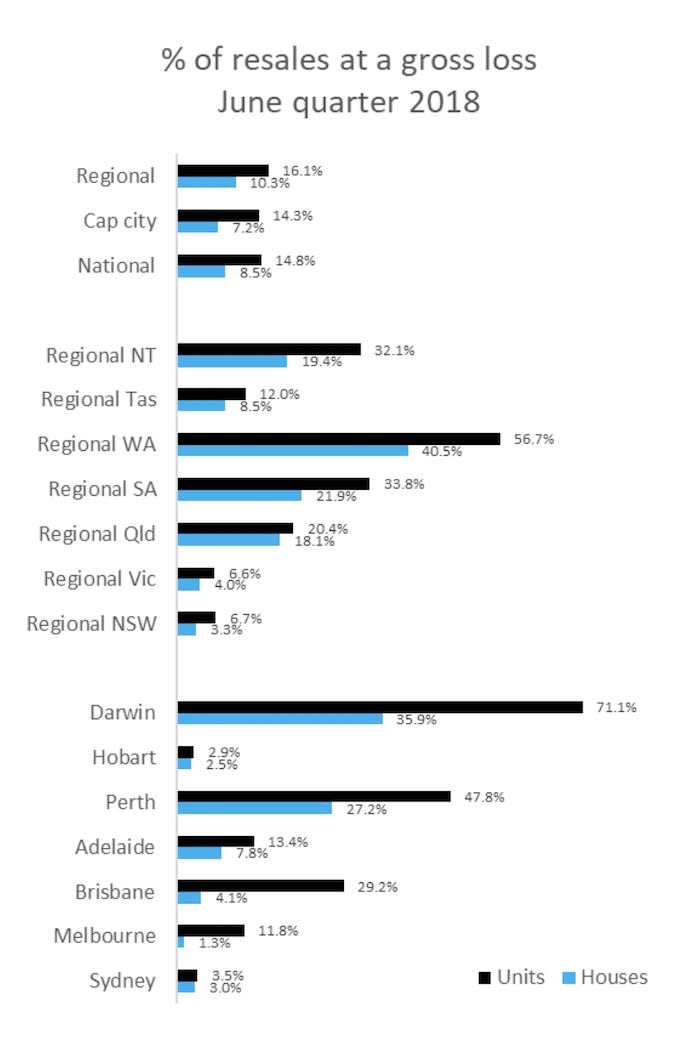Unit owners are more likely to record a loss at sale: Tim Lawless
EXPERT OBSERVER
CoreLogic’s recently released Pain and Gain report highlighted a growing divergence between houses and units for loss making resales.
Unit markets recorded a higher proportion of loss making resales relative to houses across every broad region of Australia over the June quarter.
The latest CoreLogic Pain and Gain report provides a summary of gross profit and loss making resales across the country. The results show a consistent and long underperformance across the unit sector, and more recently, a growing divergence between the proportion of houses and units reselling at a gross loss. The June quarter report revealed that 14.3% of units that resold across the capital cities transacted at a gross loss; roughly double the rate of loss making house resales. Across the combined regional areas of Australia, loss making unit resales comprised 16.1% of transactions while a lower 10.3% of houses resold at a gross loss.
Every capital city and rest of state region across the country has seen the unit sector record a larger proportion of loss making sales across the unit sector compared with detached housing, however the differential is substantial in those cities where unit values have fallen more materially.
Across the capital cities, Darwin stands out as showing the highest proportion of loss making unit resales, with 71% of units reselling at a loss over the June quarter. Considering Darwin unit values have fallen 44% since peaking in May 2010, the high rate of loss on resales should come as no surprise; in fact Darwin unit values are back to the same level they were in February 2005. Darwin house values haven’t fall any where near as much, down 11% since peaking.
Regional Western Australia has recorded the second highest level of loss making resales for units (56.7%) followed by Perth at 47.8%. Both regions have seen unit values fall substantially more than house values. Since peaking in January 2008, regional WA unit values are down 47.5% and are now back to levels seen in 1988. In Perth, unit values are 18.2% lower after peaking in July 2013 and are now worth the same value as they were in May 2006.
Amongst the capital cities, Brisbane also stood out for a high rate of loss making unit resales, with 29.2% transacting at a gross loss over the quarter compared with only 4.1% of houses selling at a gross loss. Brisbane unit values are back to where they were in August 2007 after declining by 10.8% from their 2008 peak.
The lowest rates of loss making unit resales were in those regions where unit values have shown more buoyant conditions. Hobart recorded the lowest portion of loss making unit resales, with only 2.9% reselling at a gross loss over the June quarter. Hobart unit values are at a record high after recording solid capital gains over the past few years. It was only five years ago, after a long period of weak housing market conditions, when 25% of Hobart units were reselling at a gross loss.
The Sydney unit market was showing the second lowest proportion of loss making unit resales over the June quarter. Despite rising levels of unit supply, only 3.5% of Sydney units resold at a gross loss over the quarter. Unit values are down 2.6% since peaking in November last year, and values remain 43% higher relative to five years ago. With a recent history of such strong capital gains, the vast majority of Sydney unit owners are still in a positive value position relative to their purchase price, however as values continue to slip lower and supply levels rise, we are likely to see loss making resales rise.
Click here to enlarge

There are a variety of factors that could be contributing to the higher proportion of loss making sales across the unit market.
For starters, units are more likely to be owned by investors. Around 68% of units are investor owned, 51% of townhouses are owned by investors and only 22% of houses. CoreLogic Pain and Gain data shows investor owned dwellings have a higher propensity to resell at a loss which is probably attributable to the fact that investors can take advantage of taxation benefits such as offsetting their losses against future capital gains.
Unit markets can be more prone to oversupply. This trend has been evident across the Brisbane and Melbourne inner city markets to different extents. Focusing on some of the key inner city unit markets, Brisbane’s inner city recorded 32% of unit resales at a loss over the quarter and Melbourne’s inner city recorded 22% at a loss. Unit construction has been winding down across Queensland since late 2016, but remains at record levels across Victoria and close to record highs in New South Wales. With unit values now falling in Sydney and Melbourne and the pipeline at, or close to record highs, its likely that loss making resales will diverge further in these markets.
There is also the factor of the underlying land value. Even though dwelling values are sliding in some markets, land prices have generally held firm or continued to trend higher. Detached houses have a stronger relationship with land values which is likely contributing to the long run trend of higher capital gains for houses relative to units.
Click here to enlarge
Tim Lawless heads up the CoreLogic RP Data research and analytics team
